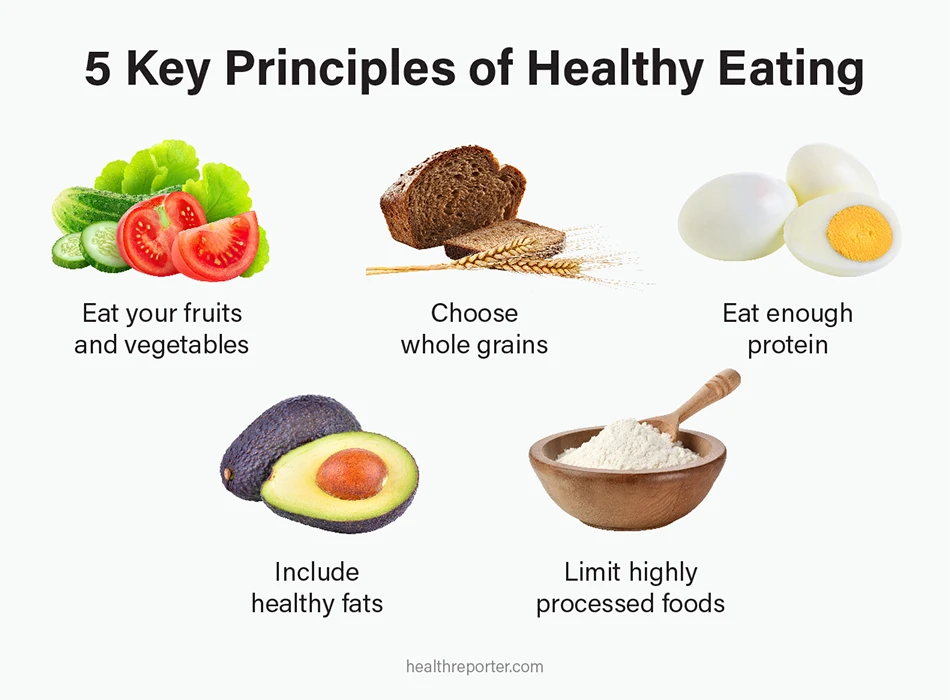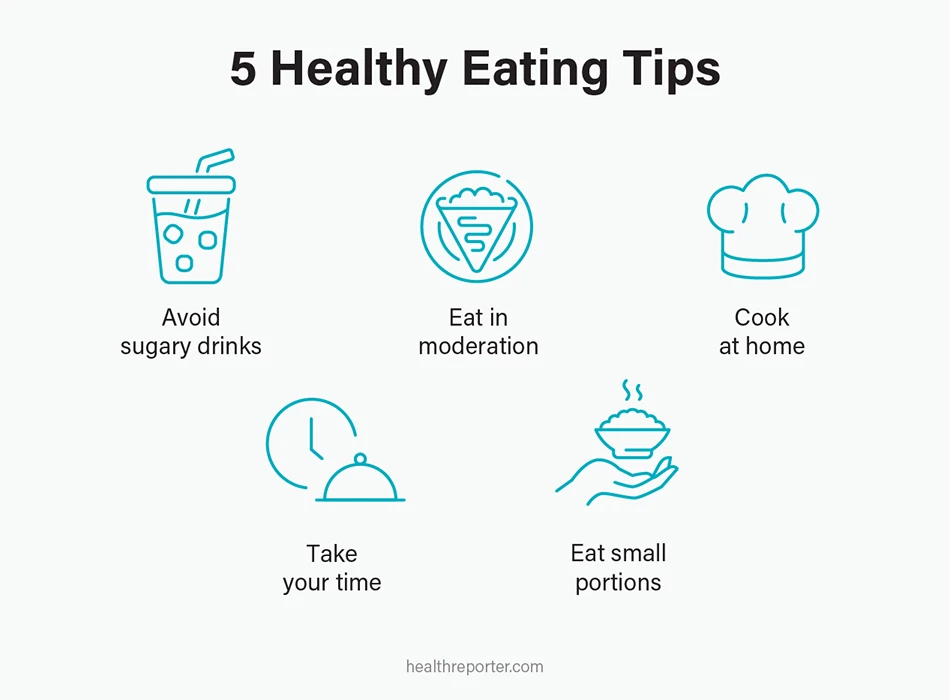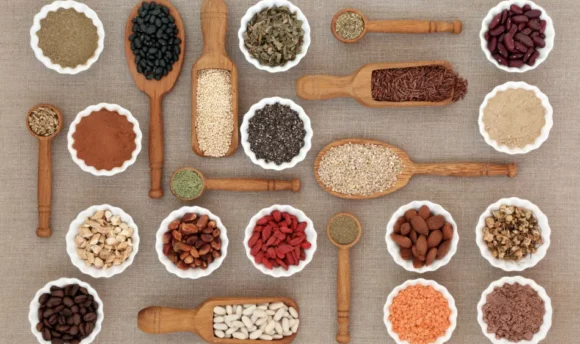Building Healthy Eating Habits: 5 Tips for Success
Healthy eating helps you maintain a healthy weight and promotes overall well-being. Here are 5 simple tips to help you develop and stick to a healthy eating pattern.

What does it mean to eat a healthy diet? Do you have to cut carbs and increase your fat and protein intake? Should you follow a plant-based diet and load up on fruits and vegetables? Or should you go low-fat and restrict your calories?
There may not be a single ideal healthy diet suitable for everyone. However, the Dietary Guidelines for Americans offer food-based recommendations that encourage a balanced diet that includes foods from each food group.
Change your life and health by learning the fundamentals of healthy eating described in this article, which healthy foods to include daily, and how to build healthy habits that stick.
5 Key Principles of Healthy Eating

A healthy balanced diet does not eliminate or restrict any specific food group. It meets your body’s nutrient needs and provides enough calories to ensure your body functions efficiently and you have the energy to get you through the day.
When you make healthy choices and eat a variety of different foods in your diet, your blood sugar levels are more stable, and you reduce the risk of chronic health conditions such as heart disease and diabetes.
Healthy eating may seem complicated. Sticking to the following 5 basic principles is very easy, and your meals will be both tasty and satisfying.
#1 Eat your fruits and vegetables
You don’t have to follow a vegan diet to benefit from the essential nutrients in plant-based foods, including fruits and vegetables. In fact, they are a pivotal component of a healthy diet and should be included in all meals and snacks.
The current dietary guidelines recommend that adults eat 1.5–2 cups of fruit (2–3 pieces) and 2–3 cups of vegetables per day. Just as important as portion size is eating a variety of fruits and vegetables.
This ensures that you meet your nutrient needs, including dietary fiber, vitamins, minerals, and phytonutrients which are associated with good gut health and a reduced risk of heart disease, stroke, and high blood pressure.
Additionally, healthy meals where fruit and veggies take up half the plate can help with weight loss. Not only do non-starchy fruits and vegetables such as apples, berries, and leafy greens provide fewer calories, but they also prevent blood sugar spikes, helping you feel fuller for longer.
#2 Choose whole grains
The dietary guidelines suggest a quarter of your plate should be filled with carbohydrate foods such as whole grains like brown rice, oats, and barley.
They are rich in carbohydrates, dietary fiber, B group vitamins, vitamin E, antioxidants, phytonutrients, and minerals such as copper, zinc, iron, and magnesium.
Eating whole grain products instead of refined grains, such as white rice, white bread, and cookies, has been shown to ensure a steady supply of energy to your body without a spike in blood glucose due to their high fiber content.
As a result, whole grains included as part of balanced meals offer several health benefits. They can help with weight loss and prevent chronic health conditions such as heart disease, certain cancers, and diabetes.
Finally, when eating products such as whole grain bread, check the nutrition facts and ingredients on the food label to ensure that your food is high in fiber and low in added sugars.
#3 Eat enough protein
Sources of protein include lean meats, fish, chicken, tofu, and legumes. These foods provide amino acids, the building blocks of all proteins, which are used to build and repair tissues in your body and form part of enzymes and antibodies.
Therefore, although protein foods provide the body with energy, their primary role is maintaining structure and function, and a healthy balanced diet must provide enough protein to do so.
The recommended amount of protein the average adult requires is only 0.8g per kilogram of body weight (0.36g per pound). That means portion sizes are relatively small, filling only a quarter of your plate.
However, you should eat protein with every meal because meals that contain protein have a higher satiety value, making this food group beneficial for weight loss.
Finally, it must be noted that animal sources of protein, such as red meat, have a high saturated fat content. Therefore, a healthy meal plan includes lean meats such as lean red meat, chicken, and fish and plant-based protein foods such as beans, lentils, and chickpeas.
#4 Include healthy fats
Healthy fat from fatty fish, nuts, seeds, avocados, and olive oil provides your body with essential fatty acids that are important for heart and brain health. They help to control chronic inflammation and offer several health benefits.
A balanced diet includes 20–35% of your calories in the form of fat. It makes your food taste better and increases your meal satiety value. However, fats are high in calories, providing twice as much energy as protein and carbohydrates.
#5 Limit highly processed foods
A healthy and balanced diet consists of mostly healthy foods such as fruits and vegetables, lean meats, unrefined grains, and healthy fats. While processed food can be enjoyed occasionally, it should be limited.
Ultra-processed foods are often high in fat and added sugars, making them high in calories, and they generally offer very little nutrition. They include foods such as hot dogs, breakfast cereals, and frozen meals.
The combination of a high energy content and low nutrient content means they may promote unhealthy weight gain, inflammation, and disease.
Unhealthy eating habits are also associated with chronic diseases such as heart disease, diabetes, obesity, and cancer. Therefore, when you indulge in processed foods, ensure that your portion sizes are small.
The Benefits of a Healthy Diet
Your body relies on the food you eat for energy and nutrients. Therefore, the quality of your diet matters. Below are 7 reasons you should make healthier choices:
- Live well for longer.
- Maintain strong bones and teeth with calcium-rich foods.
- Prevent heart disease and other chronic health conditions such as high blood pressure, diabetes, and cancer.
- Promote gut health. A healthy digestive system is associated with overall health
- Support your immune system.
- Helps you achieve and maintain a healthy weight.
- Maintain muscle mass and strength.
5 Healthy Eating Tips

With the extensive range of tempting, highly processed foods that line the aisles at the grocery store, sticking to your healthy eating plan can be challenging. Use the 5 tips below to make it easier to make healthier choices every day.
#1 Avoid sugary drinks
Sugary drinks such as sodas and energy drinks provide your body with empty calories. In other words, they give you plenty of energy and very little nutrients, which spike your blood sugar and promote weight gain and chronic health conditions.
It is crucial to stay hydrated. However, it is best to drink water instead of sugar-laden beverages. Although water requirements vary from person to person, the average recommended intake is 6–8 cups per day.
#2 Eat in moderation
Eating everything in moderation is the key to a healthy diet. That means you can occasionally indulge in your favorite sugary, processed treats so long as you generally make healthy choices and eat only as much as your body needs.
#3 Cook at home
It’s easier to make healthier food choices and eat healthy meals when you prepare your food at home. Not only will you be more likely to meet your nutrient needs, but your serving sizes will be smaller than those when you eat out or order takeout.
Research suggests that people who cook at home eat a better quality diet that includes more whole grains and vegetables and less refined carbohydrates and salt.
#4 Take your time
Healthy eating habits include the amount of time you take to eat your meals and what you are doing while you eat. Taking your time and being mindful of what you’re eating, instead of scrolling through social media or watching tv while you eat, ensures that you are aware of the signals your body sends to your brain to tell you that you are full.
#5 Eat small portions throughout the day
Studies show that people who eat smaller meals more frequently throughout the day have better cholesterol levels and a reduced risk of obesity. This suggests that eating more often is a healthy eating pattern that promotes making healthy choices.
When you are excessively hungry, you are more likely to eat larger portions and choose higher-calorie foods. Therefore, it is beneficial to include healthy snack foods such as nuts, fruits, vegetables, and yogurt between meals to avoid getting too hungry.
A Word From a Nutritionist
A healthy diet is the foundation of good health and helps to prevent disease. A balanced diet such as that described by the dietary guidelines ensures that your body gets all the energy and nutrition it needs to function well.
Changing your dietary pattern can be challenging, but the health benefits of eating a diet that includes healthy foods from each food group are a great reward.
It’s unreasonable to expect to be eating the perfect diet immediately after deciding to make healthier choices. It’s not a race. Take it one step at a time. Choose a couple of things you feel comfortable changing, perfect them, and then pick a couple more.
Before you know it, you will have changed your eating habits to include more fruits, vegetables, whole grains, healthy fats, and lean protein.
FAQs
Healthy eating means eating a balanced diet that includes foods from each food group to provide your body with the energy, protein, fat, and micronutrients it needs to function well.
Eating food that promotes a healthy weight and prevents chronic diseases instead of food that promotes inflammation and weight gain is critical for your overall health and well-being.
Unrefined grains, fruits, vegetables, protein-rich foods, and healthy fats should be eaten every day, and don’t forget to drink water to keep your body hydrated.
Conclusion
The best investment you can make in yourself is healthy eating. Limit processed foods, drink water, and increase your intake of nutrient-dense foods to stay healthy and lose weight.
Make small changes over time. Learn about healthy food, discover new recipes, and enjoy the benefits of a diet that provides just the right amount of energy and all the nutrients you need to enjoy good health.
There are numerous nutrition apps that can help you develop a healthy eating pattern, no matter which type of diet is best for you.

















































 Select your language:
Select your language: 










